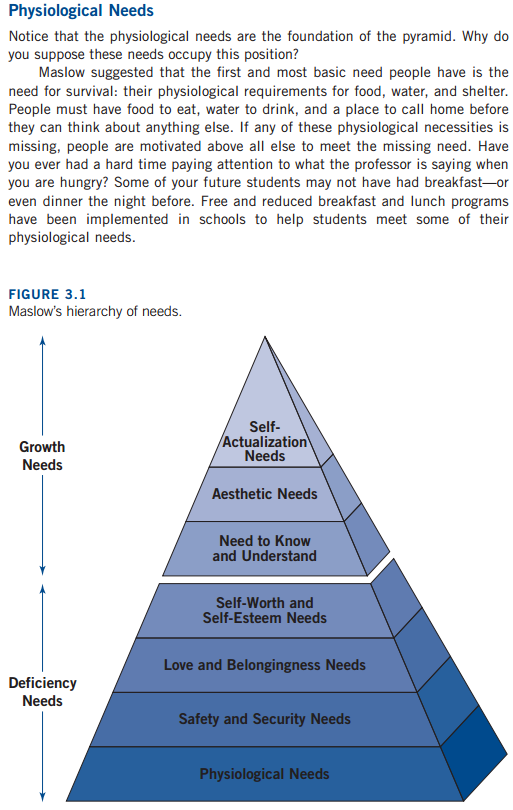Education Reform in the Philiipines Must Address Deficiency First Before Growth
I once had an insightful conversation with a successful businessman in crafts from Paete, Laguna. As he lauded my efforts in bringing computers to the elementary schools, he lamented that I was not prioritizing the needs of the school children, and of course, the basic needs of the town, in general. After all, how could a child possibly focus on a lesson with an empty stomach? His words were certainly no different from this excerpt from the Education Textbook:
The figure above is derived from Maslow's classic paper in Psychological Review. Maslow originally defined five sets of needs: physiological, safety, love, esteem, and self-actualization. The following words from the original paper are really no different from the words of the businessman from Paete:
Categorizing needs may indeed help in understanding ways to improve basic education. After all, education relies on motivation and motivation depends on needs. Assessing education reforms needs to take into account the difference between deficiency and growth as well. Providing meals to children in school may not improve learning outcomes. However, this does not necessarily mean that other interventions without attending first to the nutritional needs of children would work. Attending to deficiency needs may be necessary, but not sufficient in improving education. After all, even schools in Florida still recognize the significance of providing a meal to students:
The important word here that cannot be overlooked is "necessary". Hanushek and coworkers have looked at two decades of education research to find what works in improving schools in developing countries. Their conclusion, not quite earth-shaking, is this: "The few variables that do have significant effects – e.g. availability of desks, teacher knowledge of the subjects they teach, and teacher absence – are not particularly surprising and thus provide little guidance for future policies and programs."
My response to the businessman from Paete was that my contribution was only a simple experiment. It was aimed at opening our eyes to the importance of supporting our schools, enabling our teachers, and letting children know that we still care.
A nationwide education reform, on the other hand, must adhere to the wise words of this businessman. The reason need not be founded on Maslow's speculation for the real reason lies in pragmatism.
Meeting the growth needs of an educational system is not easy. One can simply compare the following two objectives:
The figure above is derived from Maslow's classic paper in Psychological Review. Maslow originally defined five sets of needs: physiological, safety, love, esteem, and self-actualization. The following words from the original paper are really no different from the words of the businessman from Paete:
All capacities are put into the service of hunger-satisfaction, and the organization of these capacities is almost entirely determined by the one purpose of satisfying hunger. The receptors and effectors, the intelligence, memory, habits, all may now be defined simply as hunger-gratifying tools. Capacities that are not useful for this purpose lie dormant, or are pushed into the background. The urge to write poetry, the desire to acquire an automobile, the interest in American history, the desire for a new pair of shoes are, in the extreme case, forgotten or become of secondary importance.Maslow's work lacks full empirical support. Whether one can in fact categorize human needs into five distinct and independent groups remains to be validated. However, there is support that needs can be at least categorized into two: deficiency and growth (Wahba and Bridell, 1976).
Categorizing needs may indeed help in understanding ways to improve basic education. After all, education relies on motivation and motivation depends on needs. Assessing education reforms needs to take into account the difference between deficiency and growth as well. Providing meals to children in school may not improve learning outcomes. However, this does not necessarily mean that other interventions without attending first to the nutritional needs of children would work. Attending to deficiency needs may be necessary, but not sufficient in improving education. After all, even schools in Florida still recognize the significance of providing a meal to students:
 |
| Above copied from the Brandenton Herald |
The important word here that cannot be overlooked is "necessary". Hanushek and coworkers have looked at two decades of education research to find what works in improving schools in developing countries. Their conclusion, not quite earth-shaking, is this: "The few variables that do have significant effects – e.g. availability of desks, teacher knowledge of the subjects they teach, and teacher absence – are not particularly surprising and thus provide little guidance for future policies and programs."
My response to the businessman from Paete was that my contribution was only a simple experiment. It was aimed at opening our eyes to the importance of supporting our schools, enabling our teachers, and letting children know that we still care.
A nationwide education reform, on the other hand, must adhere to the wise words of this businessman. The reason need not be founded on Maslow's speculation for the real reason lies in pragmatism.
Meeting the growth needs of an educational system is not easy. One can simply compare the following two objectives:
- Every graduate will be equipped with: information, media and technology skills, learning and innovation skills, effective communication skills, and life and career skills. (DepEd's K+12 objective)
- Every student will be provided the necessary learning materials (textbook).
Without doubt, the second objective is easier to meet for it does not require anything from neither learner nor teacher. This is all on DepEd. Yet, DepEd fails miserably in this objective. If DepEd fails in this easier task on which it has full control, the probability that DepEd can meet higher objectives is really zero. DepEd must address deficiency first to demonstrate its capability to implement simpler reforms. DepEd's K+12 is doomed to fail simply because DepEd is not even competent to meet deficiency needs.

Comments
Post a Comment